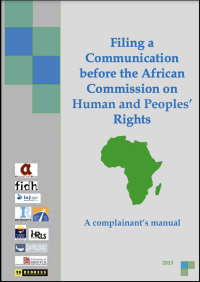Publications
REDRESS’ publications are also available in hard copy format. Please contact us for further information on [email protected].
The Sudanese Human Rights Monitor, the Africa Centre for Justice and Peace Studies, the International Federation for Human Rights (FIDH) and REDRESS submitted this briefing for consideration by the UN Human Rights Committee in the Committee’s examination of Sudan’s implemention of its obligations under the International Covenant on Civil and Political Rights (ICCPR). The 109th session of the Committee took place from 14 October to 1 November 2013. The concerns highlighted in this briefing are underpinned by serious ongoing human rights violations in conflict and non-conflict settings in Sudan, a deep-rooted culture of impunity, a weak rule of law and the failure of the Sudanese authorities to fully guarantee the absolute prohibition against torture.
This manual is intended to familiarize those without any litigation experience before the African Commission on Human and Peoples’ Rights with its communication process. The African Commission is the main forum for upholding the rights of victims of human rights violations in Africa.
In this letter, REDRESS draws attention to the incompatibility of a proposed amendment of Sudan's Armed Forces law of 2007 with international human rights obligations binding on Sudan, and urges the UN Special Rapporteur on the Independence of Judges and Lawyers to urgently raise this matter with the Government of Sudan, with a view to ensuring that any reform undertaken does not include any provisions subjecting civilians to the jurisdiction of military courts.
In this brief, REDRESS, CLRS and the Sudanese Human Rights Monitor draw attention to the incompatibility of a proposed amendment of Sudan's Armed Forces law of 2007 with international human rights obligations binding on Sudan, in particular, the provisions that would subject civilians to the jurisdiction of military courts.
This shadow report to the Committee on the Elimination of Discrimination against Women (CEDAW), for consideration of the combined 6th and 7th Report of the Democratic Republic of the Congo (DRC), focuses on the issue of access to justice for women victims of sexual violence committed in the context of the conflict in the DRC. It highlights a series of priority concerns related to access to justice and includes recommendations for each of those concerns, in order to assist the Committee in its examination of the DRC’s report and its dialogue with the DRC delegation.
From 13-14 April 2012, in the margins of the NGO Forum preceding the 51st Ordinary Session of the African Commission on Human and Peoples’ Rights (ACHPR), lawyers and other experts met in Kololi, The Gambia, to discuss victims’ experiences of accessing justice and seeking reparation. Participants included lawyers and experts from Algeria, Burundi, Ivory Coast, Chad, the Democratic Republic of Congo, Ethiopia, Kenya, Libya, Rwanda, Sierra Leone, South Africa, Sudan and Zimbabwe. Participants explored challenges and potential solutions in accessing justice at the national, (sub-) regional and international levels. Their presentations and discussions form the basis of this paper.
This discussion paper was submitted by IBUKA and it’s 15 member organisations, the Survivors Fund (SURF) and REDRESS to the government of Rwanda in October 2012 to help progress discussions on reparation (in particular in the form of rehabilitation, restitution and compensation) for survivors of the Rwandan genocide survivor organisations and other stakeholders. It is based on a series of interviews carried out for five years with survivors, Rwandan government officials and representatives of national and international human rights organisations on the issue of reparation as well as workshops and seminars. It also examines reparation mechanisms established elsewhere in the aftermath of conflict and/or in response to systematic human rights abuses, focusing in particular on South Africa, Sierra Leone and Morocco.
The purpose of this report is to explore the challenges that witnesses face in giving testimony about crimes committed during the Rwandan genocide and to assess the strength of the various processes and mechanisms established to ensure their protection.
Through examining some of their experiences and the challenges they encountered, this report seeks to identify patterns and trends that underline the need for reform in the area of victim and witness protection.
The basis of this report is an analysis of relevant Rwandan and ICTR legal documents, and individual interviews and focus groups conducted in March and April 2012 with sixty Rwandan prosecution and defense witnesses, Rwandan government officials, Rwandan and ICTR judicial personnel, as well as civil society actors and previous fieldwork conducted by REDRESS and other researchers.

